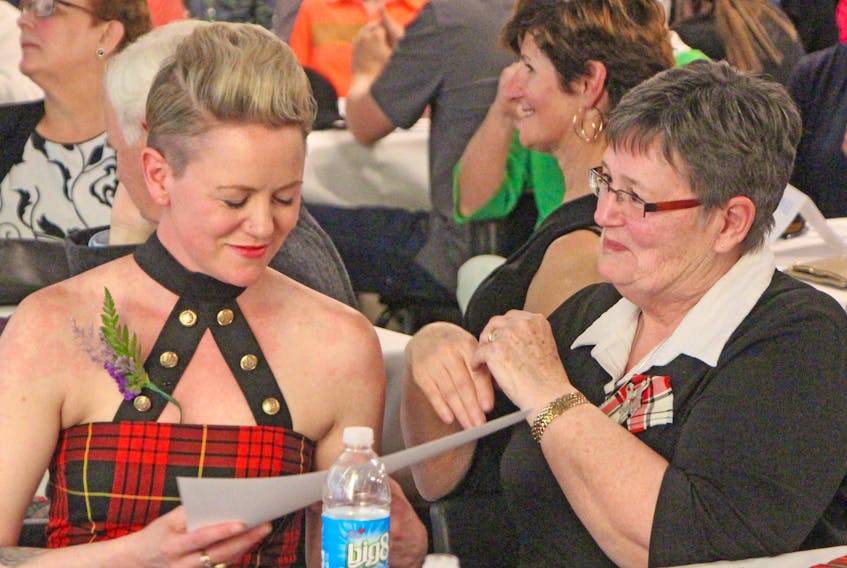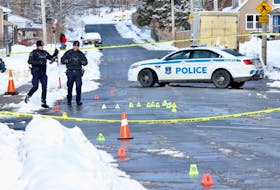ANTIGONISH, N.S. — The Antigonish Highland Society (AHS) Games’ Hall of Fame has 12 new members.
The Class of 2019, which includes Gerarda MacDonald, Wayne Thompson, Bruce Gandy, Colin Patrick MacDonald, Lianne Bradshaw, Doug Boyd, Angus Grant, Barry Ewen, Jeanie Cameron, Father Doug MacDonald, Gerald MacDonald and Stephanie Grant, were inducted during a July 11 ceremony at the East Coast Credit Union Social Enterprise Centre.
The first induction ceremony in 2013, which coincided with the 150th anniversary of the Antigonish Highland Games, included 18 individuals and two groups.
During the ceremony, each inductee – or his or her representative – took the stage as someone read their citation.
Hammer time
When it came to athletics at the Games, Wayne Thompson carried on a rich tradition.
While growing up in Cloverville, Antigonish County, he learned a lot from his father, Terry – a long-time caber toss participant – and other family members who competed at the Games. Thompson was inducted for his 20 years, from 1966 to 1986, of “versatile participation” in the Games.
In 1970, he garnered the Father Dempsey Chisholm Trophy, which goes to a junior-age class athlete, and was honoured as the most outstanding athlete from Antigonish Town and County at the Games.
Along with having the most wins in the Olympic hammer events, he was a three-time champion in senior men’s athletics (1973, 1985 and 1986).
Born to run
The late Dr. Jeanie Cameron was inducted for her almost 40 years as a stellar track-and-field athlete.
Known for her “physical prowess” in any sport she tried, the Antigonish native was selected athlete of the Games in 1975, where she won five gold and two silver medals. While dominating women’s running in Atlantic Canada from the late 1970s to the mid-1980s, Cameron remained a fixture at her beloved Games.
Throughout her life, she continued to run, with her signature competitive streak remaining front-and-centre, with success in later years coming in road races, including the annual Games’ five-miler.
Cameron remains the record-holder in both the female master and female senior master divisions for that race.
King of the caber
When he retired from Scottish heavy events competition in the prime of his career, in order to focus on his seminary studies, Father Doug MacDonald was a multi-time – and defending – Canadian champion.
“At five years of age, he realized he could watch heavy events more frequently, if he got involved in Highland dancing,” his citation reads.
MacDonald’s first participation in the Games came as a dancer.
Over a stellar 11-year career, he won several titles, including five world championships in the caber toss.
His best overall showing internationally – a third-place mark – came during the Games in Antigonish in 2003.
Championship leader
Pipe major Barry Ewen was inducted for “his proficiency as a piper, his success at our Games – as a solo competitor and a pipe major – and for his diligent work to raise the standard of piping in Nova Scotia.”
The native of Lanarkshire, Scotland, came to Canada in 1968 to become director of bagpipe music at St. Ann’s Gaelic College.
At the Games, Ewen excelled in the professional jig, while securing open piper honours on four occasions.
In 1974, he took over as pipe major of the Antigonish Legion Pipe Band, a group that had already won two North American Grade 3 titles.
In 1975, after winning top honours at the Games, the band repeated the feat in the Grade 2 Intercontinental Pipe Band Championships, a result that satisfied Ewen that they were ready to take the world championship stage the following year in Scotland.
The Antigonish band finished first in piping and third overall in Grade 2, while receiving recognition as the best overseas band.
Dandy drummer
Antigonish native Lianne Bradshaw, who started playing drums with the Clanranald Pipe Band in the early 1980s, joined the Grade 2 Scotia Legion Pipe Band – a huge jump from the Grade 4 Antigonish band – within three years.
“This rapid progression demonstrated that Lianne was a very talented pipe band drummer and eager to play at the highest level,” Iain Boyd said in reading her citation.
As a drum corps member and their instructor, Bradshaw helped the Clan Thompson Pipe Band take home the Grade 3 North American title in 1989.
Over a seven-year period, starting in 1992, she built a strong drumming program with the Antigonish Highland Society Pipe Band. In 1995, that group – one made up of mainly teenagers –won the Grade 4 North American championship.
Considered one of the most talented drummers in North America, Bradshaw garnered several accolades, including four consecutive top drummer awards at the Games, from 1989 to 1992.
Musical innovator
Blessed with “a keen ear for bagpipe tone,” as his citation describes, Antigonish native Doug Boyd started piping as an 11-year-old with a school operated by Royal Canadian Legion Arras Branch 59.
When he could play, Boyd became the youngest piper with the Grade 3 Antigonish Legion Pipe Band, a group that won several major awards, culminating with a third-place finish in Grade 2 at the world championships in 1976.
As a solo piper at the provincial level, Boyd was named Champion Supreme in Grade 2 and in 1978 Champion Supreme in Grade 1.
After three years as an open professional class competitor, he joined several pipers and drummers in forming the Scotia Legion Pipe Band, which came after the Antigonish Legion band folded.
The new group soon became the top pipe band in the Maritimes, one that won regularly at the Games.
At only 23, Boyd took over as pipe major of the Grade 2 Scotia Legion Pipe Band, one that would capture a North American crown under his leadership.
After stepping away from piping for a few years, he returned as pipe major for the young Dartmouth and District Pipe Band, one that included his sons Colin (piper) and Connor (drummer). Under his tutelage, the band collected a Grade 3 North American championship.
Boyd was inducted for a piping career in which he “encouraged musical innovation and excellence.”
Flying high
Antigonish native Stephanie Grant started Highland dancing when she was four years old.
Grant, the most-awarded Nova Scotia dancer of all time, won her first national championship when she was 14.
She is a 17-time provincial and two-time Canadian champion, while finishing in the top-6 on five occasions on the world stage, including three first runner-up titles.
At the Games, where she garnered countless awards, Grant won the Florence MacMillan Memorial Trophy more often than any other dancer – six times in nine years – an honour that goes to the top performer in the Flora MacDonald’s Fancy.
Dandy Gandy
A mainstay of the Games – both as a judge and a competitor – Bruce Gandy has excelled during his visits to Antigonish.
As a professional solo piper, his streak of victories is an incredible one, including winning the Ray Stanley Chisholm Buckle as open piper of the Games in 1999 and 2002.
Starting in 2004, Gandy rattled off nine consecutive wins, a run broken by his son, Alex, in 2011.
Since then, the elder Gandy has won open piper of the Games six more times, bringing his career mark to 17 over a 20-year period.
The speedster
Between 1967 and 1974, Colin Patrick MacDonald, who grew up on Court Street in Antigonish, was one of the top middle distance runners in the Maritimes.
His accomplishments on the track during that span include 11 first-place finishes at the Games.
MacDonald was also a key builder of the Antigonish Highland Society track and field program.
In reading his citation, Bernie ‘Bo’ Chisholm said MacDonald’s “strengths went beyond racing.”
“He was a natural organizer, and working with Frank McGibbon, he motivated other athletes to join the Highland Society track and field team,” he added.
Sky’s the limit
Gerald MacDonald learned about pole vaulting at his family’s breakfast table in Springfield, Antigonish County.
After seeing a Wheaties’ cereal box, one adorned with Olympic champion pole vaulter Bob Richards, the youngster declared to his mother that he would do the same at the Games.
In his first meet, he finished first, a result that catapulted MacDonald to a stellar career, one that included competing in the Games from 1949 to 1971.
In 1954, he was one of only two eastern Canadian athletes selected for the British Commonwealth Trials in Vancouver.
The six-time Maritime junior-senior champion garnered first place 14 times at the Games.
After retiring from competition, MacDonald became coach of the Antigonish Highland Society Track and Field Team.
Talent and grace
For her success as a solo competitor and her work as a Highland dance instructor and choreographer, Gerarda MacDonald was honoured.
The Antigonish native was the top dancer in the Maritimes for her age group in the 1960s and early 1970s, with her numerous accomplishments including several top open dancer honours at the Games.
MacDonald was also the first winner of the Florence MacMillan Trophy – named in honour of her teacher and mentor – which is awarded for the best performance in the Flora MacDonald’s Fancy.
She won that award two more times before retiring from competitive dancing and turning her attention to teaching.
From 1974 to 1984, she worked full-time as an instructor, serving as a major contributor to an era of rapid growth in Highland dance.
MacDonald was instrumental in helping bring the Canadian championships to the Games for the first time, with more than 700 dancers gathering in Antigonish in 1979 as part of the International Gathering of the Clans.
The educator
Retired educator Angus Grant grew up in Williams Point, where his family had – as his citation reads – “a strong belief in the Scottish culture and traditions of Antigonish County.”
Grant was inducted for his dedication “to training young athletes for track and field competitions and for being instrumental in introducing a complete complement of ancient Scottish heavy events to the Antigonish Highland Games.”
Grant, who helped prepare boundless athletes to compete in the Games, served as meet director in 1979, with more than 700 competitors coming to Antigonish as part of the International Gathering of the Clans.
For those same Games, he set the goal of offering a full complement of heavy events, in a new format.
There was also a change in the scoring system for the caber toss, with Grant leading the Games’ move to the traditional Scottish method, one that would eventually be adopted across Canada.
“It helped propel the Antigonish Highland Games as one of the premier games for heavy event competitors to attend,” Fraser noted.
He said Grant has been credited with moving the heavy events “into a new era of competition.”









